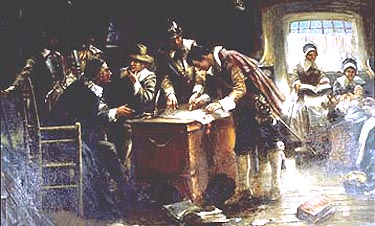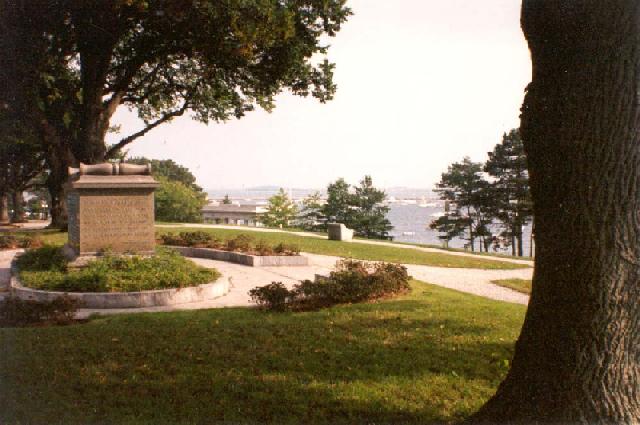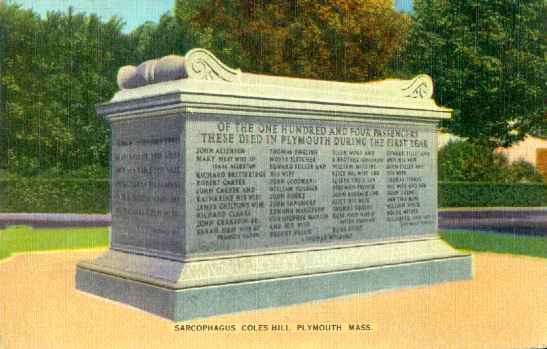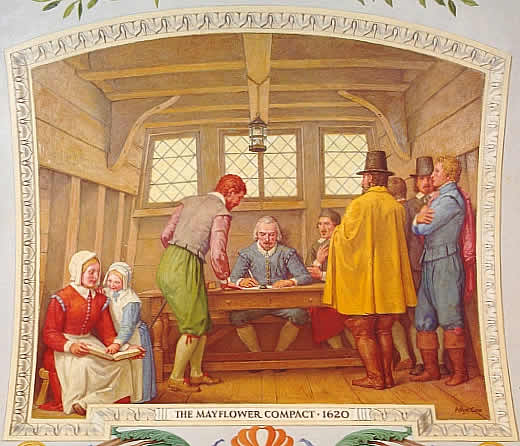
Online Texts for Craig White's Literature Courses
|
from Chapter Eleven. The remainder of Anno 1620. [Mayflower Compact] |
|
[Instructor’s note:
- The Mayflower Compact is treasured
by American historians as a prototype or preview of the USA’s Declaration
and Constitution 150 years later. Both sets of documents establish a system
of laws and a social contract governed by majority rule
- Typology: When the Jews came to the
Promised Land, they brought their own rules with them, ignoring the culture
of the established inhabitants (the Canaanites). Comparably, when the
Pilgrims come to America, they ignore the Indians’ way of life as “savage”
and irrelevant.
- “Covenant,” a concept inherited
from the relationship of Yahweh and the Jewish people, is the essential
concept by which the Pilgrims combine religious devotion and civil
government.
- Historical background and theme: As the opening paragraph indicates, not Virginia, difficulty of controlling new inhabitants in land where the native culture has little authority—cf. other colonial situations in Asia, Africa, the Middle East
from Chapter Eleven. The remainder of Anno 1620. [Mayflower Compact]
[¶11.1] I shall a little return back and begin with a combination [contract, covenant] made by them before they came ashore, being the first foundation of their government in this place; occasioned partly by the discontented and mutinous speeches that some of the strangers [non-Separatists] amongst them had let fall from them in the ship—That when they came ashore they would use their own liberty; for none had power to command them, the patent they had being for Virginia, and not for New England, which belonged to another Government, with which the Virginia Company had nothing to do. And partly that such an act by them done (this their condition considered) might be as firm as any patent [official document], and in some respects more sure.
[¶11.2] The form was as followeth.
IN THE NAME OF GOD, AMEN. We, whose names are underwritten, the Loyal Subjects of our dread Sovereign Lord King James, by the Grace of God, of Great Britain, France, and Ireland, King, Defender of the Faith, &c. Having undertaken for the Glory of God, and Advancement of the Christian Faith, and the Honor of our King and Country, a Voyage to plant the first Colony in the northern Parts of Virginia; Do by these Presents, solemnly and mutually, in the Presence of God and one another, covenant and combine ourselves together into a civil Body Politick, for our better Ordering and Preservation, and Furtherance of the Ends aforesaid: And by Virtue hereof do enact, constitute, and frame, such just and equal Laws, Ordinances, Acts, Constitutions, and Officers, from time to time, as shall be thought most meet and convenient for the general Good of the Colony; unto which we promise all due Submission and Obedience. IN WITNESS whereof we have hereunto subscribed our names at Cape Cod the eleventh of November, in the Reign of our Sovereign Lord King James, of England, France, and Ireland, the eighteenth, and of Scotland the fifty-fourth, Anno Domini; 1620.
[50 signatures, including Bradford's]

artist's rendering of signing of Mayflower
Compact
[¶11.3] After this they chose, or rather confirmed, Mr. John Carver (a man godly and well approved amongst them) their Governor for that year. And after they had provided a place for their goods, or common store, (which were long in unlading for want of boats, foulness of winter weather, and sickness of diverse,) and begun some small cottages for their habitation, as time would admitte, they met and consulted of laws and orders, both for their civil and military Government, as the necessity of their condition did require, still adding thereunto as urgent occasion in several times, and as cases did require. [contrast the Pilgrims’ inclination to meet with the individualistic, anti-government attitudes of other immigrants in the dominant culture.]
[The next paragraph (¶11.4) describes “the starving time” of the first winter, in which nearly half of the 102 Pilgrims perished. More positively, Bradford describes the ordeal as one in which individuals sacrifice for the community—an event he seems to remember in later regrets at the community’s dispersal.]
[¶11.4] In these hard and difficult beginnings they found some discontents and murmurings arise amongst some, and mutinous speeches and carriages [behaviors] in other; but they were soon quelled and overcome by the wisdom, patience, and just and equal carriage [bearing] of things by the Governor and better part, which clave [slung] faithfully together in the main. But that which was most sad and lamentable was, that in two or three months time, half of their company died, especially in January and February, being the depth of winter, and wanting houses and other comforts; being infected with the scurvy [disease typical on long sea voyages resulting from lack of vitamin C] and other diseases, which this long voyage and their inaccomodate [inhospitable] condition had brought upon them; so as there died some times two or three [persons] a day, in the foresaid time; that of 100-odd persons, scarce 50 remained.


On Cole's
Hill overlooking
[¶11.5] And of these in the time of most distress, there was but six or seven sound persons, who, to their great commendations be it spoken, spared no pains, night nor day, but with abundance of toil and hazard of their own health, fetched them wood, made them fires, dressed [prepared] them meat, made their beds, washed their loathsome [soiled] clothes, clothed and unclothed them; in a word, did all the homely and necessary offices for them which dainty and queasy stomachs cannot endure to hear named; and all this willingly and cheerfully, without any grudging in the least, showing herein their true love unto their friends and brethren. A rare example and worthy to be remembered. Two of these seven were Mr. William Brewster, their reverend Elder, and Myles Standish, their Captain and military commander, unto whom myself, and many others, were much beholden in our low and sick condition. And yet the Lord so upheld these persons, as in this general calamity they were not at all infected either with sickness, or lameness. And what I have said of these, I may say of many others who died in this general visitation, and others yet living, that whilst they had health, yea, or any strength continuing, they were not wanting to any that had need of them. And I doubt not but their recompense is with the Lord.
[typology: Just as Bradford remembers the Jews of the Exodus story as “example(s) . . . worthy to be remembered,” in the paragraph above he describes the first settlers as a type for emulation or imitation.]

